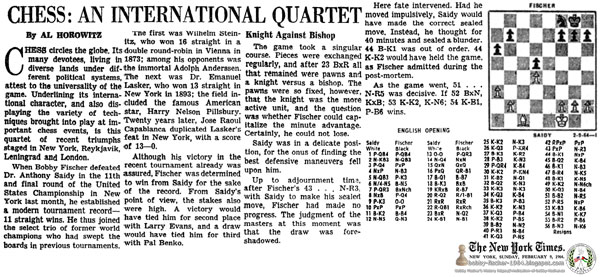New York Times, New York, New York, Monday, February 09, 1964 - Page 365
Chess: An International Quartet
By Al Horowitz
Chess circles the globe. Its many devotees, living in diverse lands under different political systems, attest to the universality of the game. Underlining its international character, and also displaying the variety of techniques brought into play at important chess events, is this quartet of recent triumphs staged in New York, Reykjavik, Leningrad and London.
When Bobby Fischer defeated Dr. Anthony Saidy in the 11th and final round of the United States Championship in New York last month, he established a modern tournament record—11 straight wins. He thus joined the select trio of former world champions who had swept the boards in previous tournaments.
The first was Wilhelm Steinitz, who won 16 straight in a double round-robin in Vienna in 1873; among his opponents was the immortal Adolph Anderssen. The next was Dr. Emanuel Lasker, who won 13 straight in New York in 1893; the field included the famous American star, Harry Nelson Pillsbury. Twenty years later, Jose Raoul Capablanca duplicated Lasker's feat in New York, with a score of 13—0.
Although his victory in the recent tournament already was assured, Fischer was determined to win from Saidy for the sake of the record. From Saidy's point of view, the stakes also were high. A victory would have tied him for second place with Larry Evans, and a draw would have tied him for third with Pal Benko.
Knight Against Bishop
The game took a singular course. Pieces were exchanged regularly, and after 23 BxR all that remained were pawns and a knight versus a bishop. The pawns were so fixed, however, that the knight was the more active unit, and the question was whether Fischer could capitalize the minute advantage. Certainly, he could not lose.
Saidy was in a delicate position, for the onus of finding the best defensive maneuvers fell upon him.
Up to adjournment time, after Fischer's 43 … N-R3, with Saidy to make his sealed move, Fischer had made no progress. The judgment of the masters at this moment was that the draw was foreshadowed.
Here fate intervened. Had he moved impulsively, Saidy would have made the correct sealed move. Instead, he thought for 40 minutes and sealed a blunder. 44 B-K1 was out of order. 44 K-K2 would have held the game, as Fischer admitted during the post-mortem.
As the game went, 51…N-R5 was decisive. If 52 BxN, KxB; 53 K-K2, K-N6; 54 K-B1, P-B6 wins.























